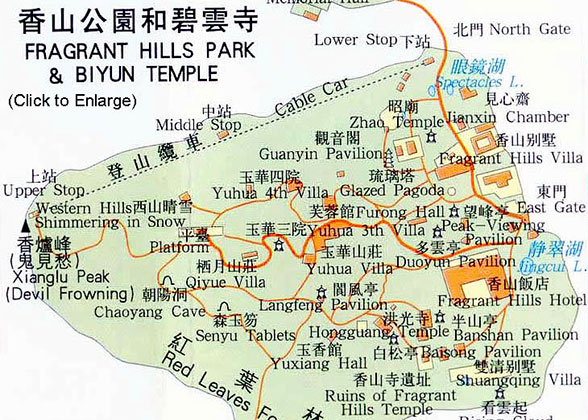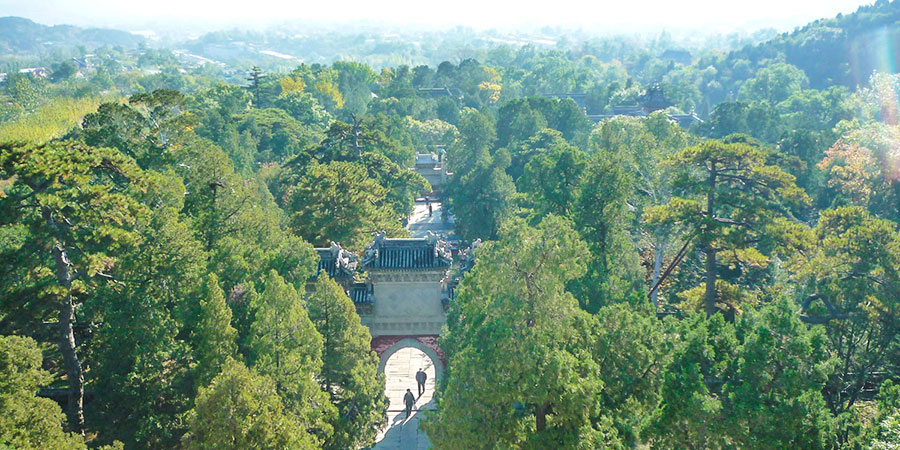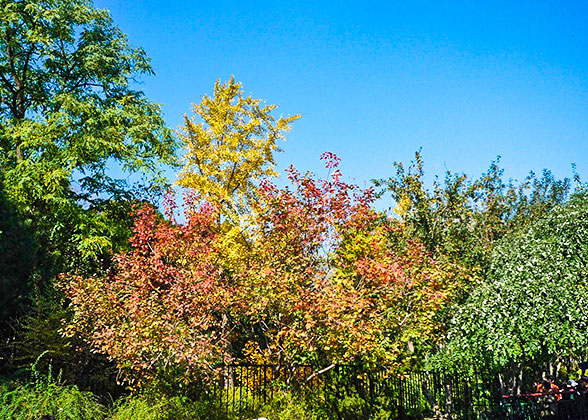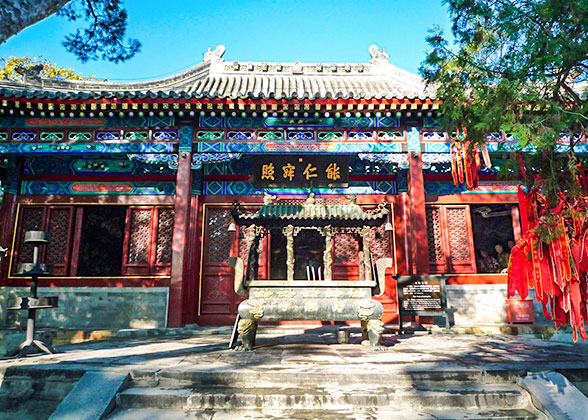Fragrant Hills Park (Xiangshan Park)
Fragrant Hills Park, aka Xiangshan Park, was first built in 1186 in the Jin Dynasty (1115-1234) and later expanded in the Yuan and Ming dynasties. In 1745, Emperor Qianlong (1711-1799) ordered the addition of many new halls, pavilions and gardens and gave it a new name, Jingyi Garden, meaning a Garden of Tranquility and Pleasure. Unfortunately, in 1860 and 1900 after the Summer Palace and the Yuanming Yuan (the Old Summer Palace) were set on fire, lots of relics in the Fragrant Hills were damaged by foreign troops. Since 1949, with a half-century's restoration and development by Chinese government, it has been recognized as one of the ten most famous parks in Beijing.
 |
| Map of Fragrant Hills Park |
The most spectacular natural scenery in the Fragrant Hills Park is the red smoke tree leaves over the mountains. When autumn arrives, fiery red leaves blanket the entire mountain. Every year, thousands of tourists come to it. The cable cars are a great way to take in the beautiful scenes.
Visitors may take two main routes to explore the park. The first one is to go along the north route, where visitors will see Spectacles Lake (Yanjing Lake), Study of Reading Heart (Jianxin Zhai), Bright Temple (Zhao Miao), etc. Spectacles Lake is a lake divided half by a bridge. Study of Reading Heart was built in the Ming Dynasty (1368-1644) and was noted as the park inside it. Bright Temple is a large Tibetan style lamasery complex built in 1780 as the residence for the sixth Panchen Lama during his visits to Emperor Qianlong. Buildings in the complex have partially been burned down. Among the surviving treasures are a majestic glazed-tiled archway in front of the complex, a Tibetan style terrace and a glazed-tiled pagoda. Bells hung on the eaves of the pagoda chime in breeze.
 |
| Fragrant Hills Park |
Another route leads to the south area of Fragrant Hills Park. Main attractions along the route include Tranquility Green Lake (Jingcui Lake), Shuangqing Villa, Fragrant Temple, Xianglu Peak, etc. This route is a little hard for the highest peak, Xianglu Peak. However it is worthwhile to try. One of the 'must see' points of interest is the Shuangqing Villa, which is attractive not for its natural beauty but more for its place in Chinese history - it was once the residence of Chairman Mao Zedong as well as an early sight for the headquarters of the Central Committee of the Chinese Communist Party. The alluring beauty of it for you to appreciate all it has to offer.
 |
| Red Leaves |
This hill is one the most famous places in China to see the red leaves. Red Leaves Festival is held every Mid-October to early November. That is the busiest time of it. Travelers had better go there in week days to avoid great number of visitors in the weekends.
Best places to see red leaves:
![]() Fragrant Hills Temple (Xiangshan Temple)
Fragrant Hills Temple (Xiangshan Temple)
The temple is in the south hill foot close to Shuangqing Villa. First built in Tang Dynasty, the temple is the origin of Fragrant Hill's culture. Be cautious of many steps in this area. ![]() Best time to see red leaves: circa October 18 - November 2
Best time to see red leaves: circa October 18 - November 2
![]() Heshun Gate:
Heshun Gate:
It is on the south hillside, 980 feet (300m) above the ground. It is close to the red leave trees. ![]() Best time to see red leaves: circa October 25 - November
Best time to see red leaves: circa October 25 - November
![]() Yuhua Xiu:
Yuhua Xiu:
This is the largest flat area in it and the road to it from the east gate is even, within 20 minutes' walk along the middle road. There is broad field of vision. ![]() Best Time to see red leaves: October 18 - November 4
Best Time to see red leaves: October 18 - November 4
![]() Xiangwu Ku (literally Fragrant Mist Cave)
Xiangwu Ku (literally Fragrant Mist Cave)
It has classical garden environment on the hillside. It takes over half an hour to climb up to this place. ![]() Best time to see red leaves: October 15 - November 4
Best time to see red leaves: October 15 - November 4
Recommended red leaves watching routes:
 |
| Biyun Temple |
![]() Route 1: East gate - Jingcui Lake - Shuangqing Villa - Xiangshan Temple - Heshun Gate - hill top
Route 1: East gate - Jingcui Lake - Shuangqing Villa - Xiangshan Temple - Heshun Gate - hill top![]() Tips: The route takes about two hours. Need to climb up the hill.
Tips: The route takes about two hours. Need to climb up the hill.
![]() Route 2: East gate - Yuhua Xiu - Xiangwu Ku - hill top
Route 2: East gate - Yuhua Xiu - Xiangwu Ku - hill top![]() Tips: This is a meek route and suitable for family going together.
Tips: This is a meek route and suitable for family going together.
![]() Route 3: North gate - cable car station - hill top
Route 3: North gate - cable car station - hill top![]() Tips: It is 5 minutes' walking distance from the north gate southward to the cable car. By cable, you can get to the hill top nearly 20 minutes later. You can have a bird-eye view of Temple of Azure Clouds (Biyun Temple) and overlook the red leaves afar.
Tips: It is 5 minutes' walking distance from the north gate southward to the cable car. By cable, you can get to the hill top nearly 20 minutes later. You can have a bird-eye view of Temple of Azure Clouds (Biyun Temple) and overlook the red leaves afar.
How to get there
![]() By Subway:
By Subway:
1. Take line 10 to Bagou Station. Then transfer to Western Suburban Line and get off at Xiangshan Station. Walk southwest around 900 meters (984 yards) to arrive at the ticket office of this park.
2. Take line 4 and get off at Beigongmen Station. Get out from Exit A and transfer to bus 563 to Xiangshan Gongyuan Dongmen (east gate of the Fragrant Hills Park) Station.
![]() By Bus:
By Bus:
Take bus 563 to Xiangshan Gongyuan Dongmen (East Gate of Fragrant Hills Park) Station, then walk westward for about 600 yards to the gate.
Beijing Bus / Subway Search
| Admission Fee | Apr. 1 to Nov. 15: CNY 10 Nov. 16 to Mar. 31: CNY 5 | Half-price tickets for minors aged 7-18 Free tickets for children under 6 and the old over 60 |
| Temple of Azure Clouds | CNY 10 | |
| Opening Hours | Apr. 1 - Nov. 15: 06:00 to 19:30 (stop entering at 18:30) Nov. 16 - Mar. 31: 06:00 to 19:00 (stop entering at 18:00) | |
One-day Beijing Fragrant Hills Park Tour to See Red Leaves: best time is middle October to early November
Beijing 1-Day Hiking from Xiangshan Post Office to Badachu Park: one of the most classic hiking routes in Beijing
More Beijing Tours
Where to Go in Beijing in Spring - Top 10 Destinations
8 Most Beautiful Places in Beijing in Autumn
Botanical Garden
Wofo Temple (Temple of Recumbent Buddha)
Badachu Park